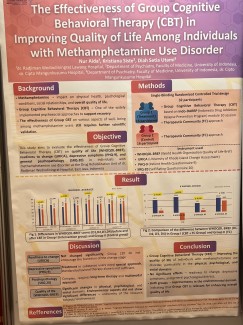Effectiveness of Group Cognitive Behavior Therapy (CBT) on Improving Quality of Life in People with Methamphetamine Disorder

Background:
Methamphetamine abuse has a devastating impact on physical health, psychological conditions, social relationships, and overall quality of life. One of the widely implemented psychosocial approaches to support recovery is Group Cognitive Behavioral Therapy (CBT). However, the effectiveness of Group CBT on various aspects of well- being among methamphetamine users still requires further scientific validation.
Objective:
This study aims to evaluate the effectiveness of Group Cognitive Behavioral Therapy (CBT) on quality of life, readiness to change, depressive symptoms, and general psychopathology in individuals with methamphetamine use disorder at the NAPZA Rehabilitation Unit of dr. Radjiman Wediodiningrat Hospital, East Java, Indonesia
Method:
This study employed a Single-Blinding Randomized Controlled Trial design with 32 participants divided into two groups: Group I as the treatment group, which received Group Cognitive Behavioral Therapy (CBT) based on the Indo-DARRP (Indonesia Drug Addiction Relapse Prevention Program) module for 10 sessions along with a Therapeutic Community (TC) approach, and Group II as the control group, which received only TC. The instruments used in this study included the WHOQOL-BREF, URICA, PHQ-9, and SRQ-20.
Results:
Group Cognitive Behavioral Therapy (CBT) showed a significant effect in improving quality of life (WHOQOL-BREF) in the physical, psychological, and social dimensions within the treatment group, with statistically significant differences between the two groups (p < 0.05). However, Group CBT did not produce significant effects (p > 0.05) on URICA scores (readiness to change), PHQ-9 (depressive symptoms), or SRQ-20 (general psychopathology). Significant changes were also observed in the environmental domain within each group (p < 0.05), although no significant differences were found between groups.
Conclusion:
Group Cognitive Behavioral Therapy (CBT) has proven beneficial in improving the quality of life of individuals with methamphetamine use disorder, particularly in the physical, psychological, and social domains. However, no significant effects were found on readiness to change, depressive symptoms, or general psychological distress. Improvements in the environmental domain were observed in both groups, likely influenced by the supportive rehabilitation setting, indicating that Group CBT is relevant for enhancing overall quality of life.
Keywords: Group Cognitive Behavioral Therapy, quality of life, methamphetamine use disorder